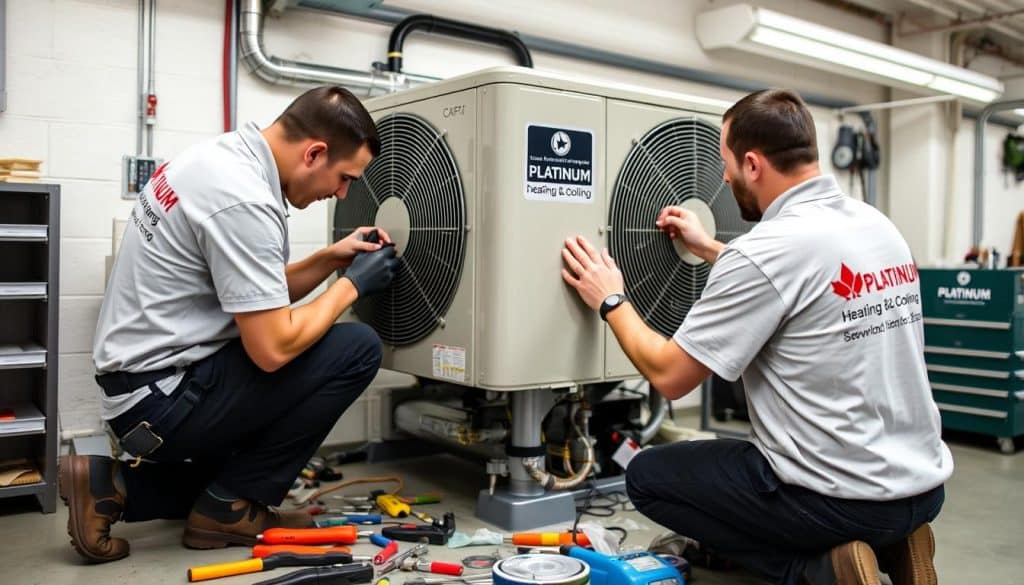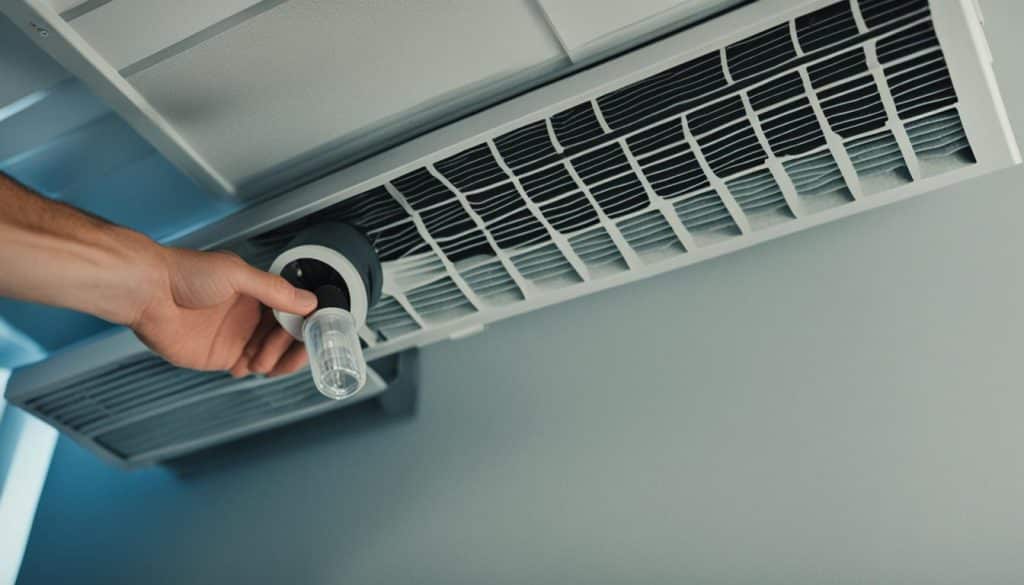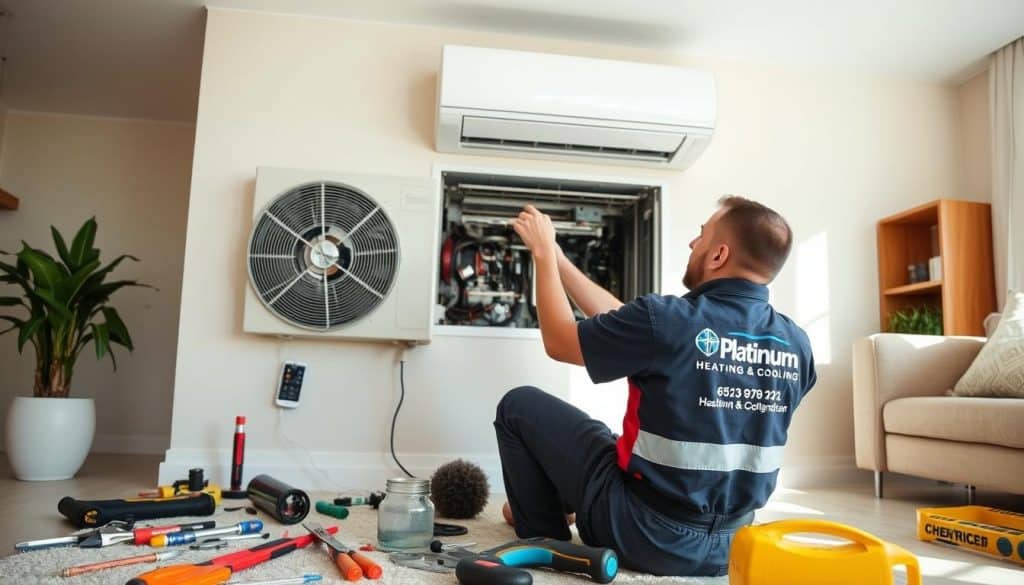Table of Contents
Is your home feeling like a sauna this summer? Many Americans face this problem when their air conditioner doesn’t cool as expected. The question “Why is my AC not cooling?” often comes up, leaving you searching for answers.
Figuring out why your air conditioner isn’t working right often means finding specific problems. Issues like low refrigerant, broken parts, or wrong thermostat settings can cause problems. Regular HVAC maintenance helps avoid these issues.
If you don’t fix the problem quickly, your AC might keep not working well. Let’s look at common reasons for this issue and how to solve them to get cool air again.
Key Takeaways:
- Identifying the root of AC problems can save time and money on repairs.
- Regular HVAC maintenance ensures optimum efficiency and longevity of your cooling system.
- Common AC issues include refrigerant leaks, airflow restrictions, and faulty thermostats.
- Proper troubleshooting can prevent further damage to your central AC unit.
- Understanding your AC system aids in effective air conditioning repair and maintenance.
Common Reasons Your AC is Not Cooling
Many things can affect how well an air conditioner works. Knowing these can help you fix problems and keep your AC running right.
Dirty Cooling Coils
Dirty cooling coils make it hard for heat to be moved away. This can cause your AC to not cool properly. Keeping them clean helps a lot.
Refrigerant Leaks
Leaks of refrigerant can hurt efficiency and be bad for the environment and health. If refrigerant levels go down, your AC won’t cool well. Finding and fixing these leaks is key.
Blocked Condenser Unit
Stuff outside, like plants or debris, can block the condenser unit. This stops it from cooling right. Clearing these blockages is important for good cooling.
Dirty Air Filter
A dirty air filter can mess up indoor air and airflow. It also stops air from reaching the evaporator coils. Replacing the air filter regularly helps keep everything running smoothly.
Compressor Problems
The compressor is crucial for the AC system. It makes the refrigerant work right. If it fails, it’s a big problem that might need a pro to fix.
Aging System
As air conditioners get older, they don’t work as well. They might need to be replaced. Regular checks can help them last longer, but sometimes they just need to be replaced.
Improper Thermostat Settings
Setting the thermostat wrong can make the fan blow air without cooling. This happens if it’s set to “on” instead of “auto”. Fixing these settings can solve cooling problems easily.
How an Air Conditioner Works
Understanding how an air conditioner works can help fix cooling system issues. The main idea is the refrigeration cycle. We’ll explain the main parts and steps.
Refrigeration Cycle
The refrigeration cycle is the core of a central AC system. It begins with the refrigerant fluid going through the evaporator coil inside the home. As it absorbs heat from the air, it changes from liquid to vapor.
This change is key for finding and fixing cooling system problems.
Heat Transfer Process
After changing, the refrigerant vapor goes to the compressor in the outdoor unit. Here, it gets pressurized and its temperature rises a lot. The hot vapor then goes to the condenser coil outside.
Here, it releases the heat it absorbed, turning back into a liquid. This process keeps your home cool and involves important parts like the evaporator coil, compressor, and condenser unit.
Importance of Regular HVAC Maintenance
Keeping your air conditioning system running well needs regular maintenance. This care keeps it efficient and long-lasting. It also helps fix problems before they start.
Annual Tune-Ups
Getting your air conditioner checked every year is key. These checks find and fix problems early. They include cleaning, adjustments, and replacing parts if needed.
By doing this, your system stays in top shape. It avoids sudden breakdowns and cuts down on the need for big repairs.
Preventative Measures
Preventive steps in HVAC care are crucial. They help keep your system healthy. Regular checks find issues early, saving you from expensive fixes.
Keeping up with maintenance means your air conditioner works better. It avoids overworked parts and slows down wear and tear.
Extending System Lifespan
To make your air conditioner last longer, be proactive about maintenance. Regular service keeps parts in good shape. This makes your system more durable and reliable.
Joining maintenance programs or getting regular checks helps avoid big repairs. It keeps your home cool and comfortable. Good maintenance saves you money and keeps your cooling system running smoothly for years.
Why is my AC not cooling?
Is your air conditioner not cooling? There are several common reasons for this problem. Let’s look at these causes and how to fix them.
Insufficient Airflow
An air conditioner with poor airflow can’t cool your space well. This issue often comes from blockages or problems in the ductwork. Also, a dirty or clogged air filter can block airflow. Regular HVAC maintenance is key to keeping your system running right.
Thermostat Issues
Thermostat problems can also cause cooling issues. Wrong settings or dead batteries can mess up the thermostat’s temperature control. Make sure your thermostat is set right and working well.
Electrical Problems
Electrical issues in AC units, like tripped circuit breakers or bad wiring, can stop the system from working. These problems need a pro to fix them safely.
Faulty Components
Bad HVAC parts, like faulty capacitors, damaged compressors, or broken fan motors, can also cause cooling problems. Regular maintenance and quick repairs by experts, like those at Platinum Heating & Cooling, can solve these issues and keep your AC efficient.
Common Problems With Thermostats
Having a thermostat that works right is key for your AC to cool your space well. Issues like setting it to heat instead of cool or fan settings not on “auto” are common. Also, battery-operated thermostats can fail if the batteries run out, and smart thermostats might need a reboot or hard reset.
Thermostats placed in direct sunlight or near heat sources can give wrong readings. Fixing these problems helps your thermostat talk to your AC unit better. This ensures your space stays cool and comfortable.
When you troubleshoot your AC, you might find these thermostat issues. Make sure to check and adjust your thermostat regularly. This keeps your HVAC system running smoothly.
Refrigerant Issues and Their Symptoms
Refrigerant is key to your air conditioning unit’s cooling power. Problems with refrigerant can harm your AC’s performance and efficiency. Knowing these issues helps spot and fix problems early.
Low Refrigerant Levels
Low refrigerant levels often cause cooling problems. If your AC’s refrigerant is low, it won’t cool your space well. Look out for signs like not enough cooling and ice on the refrigerant lines. These are signs you need HVAC maintenance fast.
Refrigerant Leaks
Refrigerant leaks can really mess up your AC. You might hear a hissing sound from your unit, which means a leak. This not only makes your AC less efficient but can also cause bigger problems later. Fixing leaks quickly with help from pros like Platinum Heating & Cooling is key to keeping your AC running right.
Environmental and Health Impacts
The effects of refrigerant on the environment are huge. Some refrigerants can contribute to global warming. Leaks can also be harmful to your health because of toxic gases. It’s important to follow environmental rules and fix leaks fast to protect yourself and the planet. Regular HVAC checks can prevent these issues and keep your system safe and efficient.



